
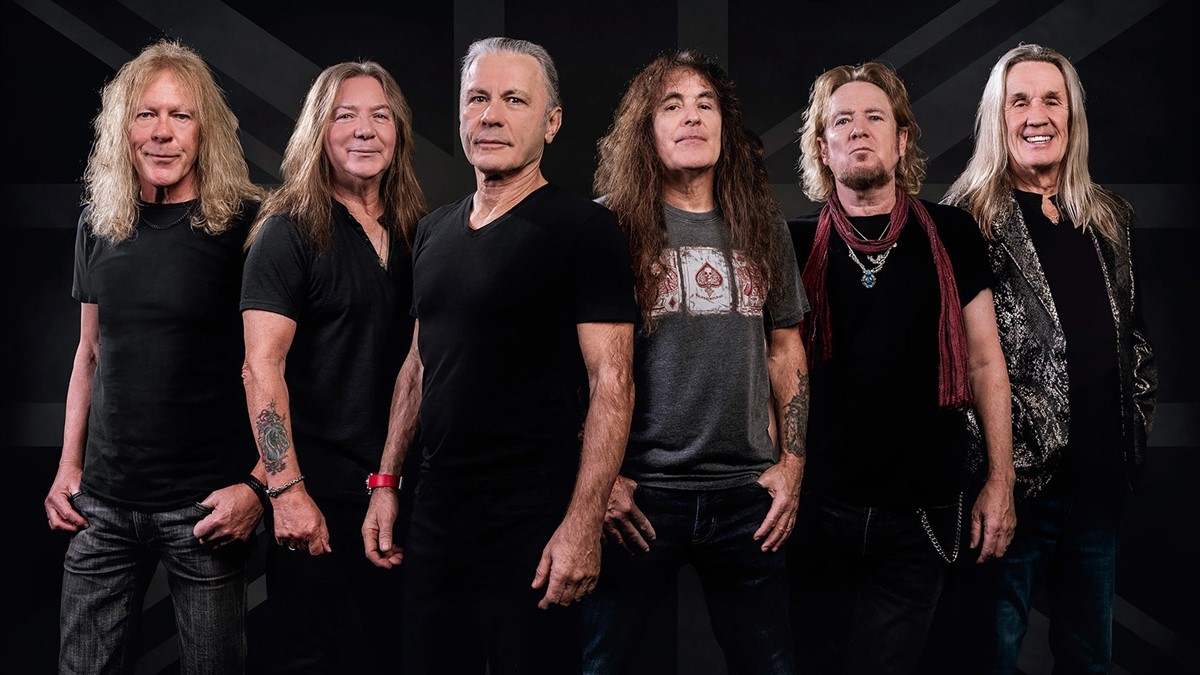
Iron Maiden are an English Heavy metal band formed in Leyton, East London, in 1975 by bassist and primary songwriter Steve Harris. Although fluid in the early years of the band, the line-up for most of the band's history has consisted of Steve Harris, lead vocalist Bruce Dickinson, drummer Nicko McBrain, and guitarists Dave Murray, Adrian Smith and Janick Gers. As pioneers of the New wave of British heavy metal movement, (NWOBHM) Iron Maiden released a series of UK and US Platinum and Gold albums, including 1980's debut album, Iron Maiden, 1981's Killers, and 1982's The Number of the Beast – its first album with Bruce Dickinson, who in 1981 replaced Paul Di'Anno as lead singer. The addition of Bruce Dickinson was a turning point in their career, establishing them as one of heavy metal's most important bands. The Number of the Beast is among the most popular heavy metal albums of all time, having sold almost 20 million copies worldwide.
After some turbulence in the 1990s, the return of lead vocalist Bruce Dickinson and guitarist Adrian Smith in 1999 saw the band undergo a resurgence in popularity, with a series of new albums and highly successful tours. Their three most recent albums, The Final Frontier (2010), The Book of Souls (2015), and Senjutsu, (2021) have all reached No. 1 in more than 25 countries.
Iron Maiden have sold over 130 million copies of their albums worldwide and have obtained over 600 certifications. The band is considered to be one of the most influential and revered metal bands of all time. The band and its members have received multiple industry awards, including the Grammy Awards, Brit Awards, Silver Clef Award, Nordoff-Robbins Award, Ivor Novello Awards, Juno Awards, Spanish Music Awards, and Guinness Book of World Records. The band are also a part of permanent exhibitions of the Rock and Roll Hall of Fame, British Music Experience, Rock in Rio Wall of Fame, Metal Across America Exhibition and Wacken Open Air Hall of Fame. In 2023 Iron Maiden were honoured by Royal Mail UK with dedicated postal stamps and cards.
The band have released 41 albums, including 17 studio albums, 13 live albums, four EPs and seven compilations. They have also released 47 singles and 20 video albums, and two video games. Iron Maiden's lyrics cover such topics as history, literature, war, mythology, society and religion. As of October 2019, the band have played some 2,500 live shows. For over 40 years the band have featured their signature mascot, "Eddie", (Eddie the Head) on the covers of almost all of their releases.
Early years (1975–1978)
Iron Maiden were formed on Christmas Day, 25 December 1975, by bassist Steve Harris shortly after he left his previous group, Smiler. Steve Harris attributed the band's name to a film adaptation of The Man in the Iron Mask from the novel by Alexandre Dumas, as the title reminded him of the iron maiden torture device. They originally used the name, Ash Mountain, but most of the band members preferred the name Iron Maiden. After months of rehearsal, Iron Maiden made their debut at St. Nicks Hall in Poplar on May 1, 1976, before taking up a semi-residency at the Cart and Horses Pub in Maryland, Stratford.
The original line-up was short-lived, with vocalist Paul Day being the first to go as, according to Harris, he lacked "energy or charisma on stage". He was replaced by Dennis Wilcock, a Kiss fan who used makeup and fake blood during live performances. Wilcock's friend, guitarist Dave Murray, was invited to join, much to the dismay of the band's guitarists Dave Sullivan and Terry Rance. Their frustration led Steve Harris to temporarily disband Iron Maiden in 1976, though the group reformed soon after with Dave Murray as the sole guitarist. Steve Harris and Dave Murray remain the band's longest-serving members and have performed on all of their releases.
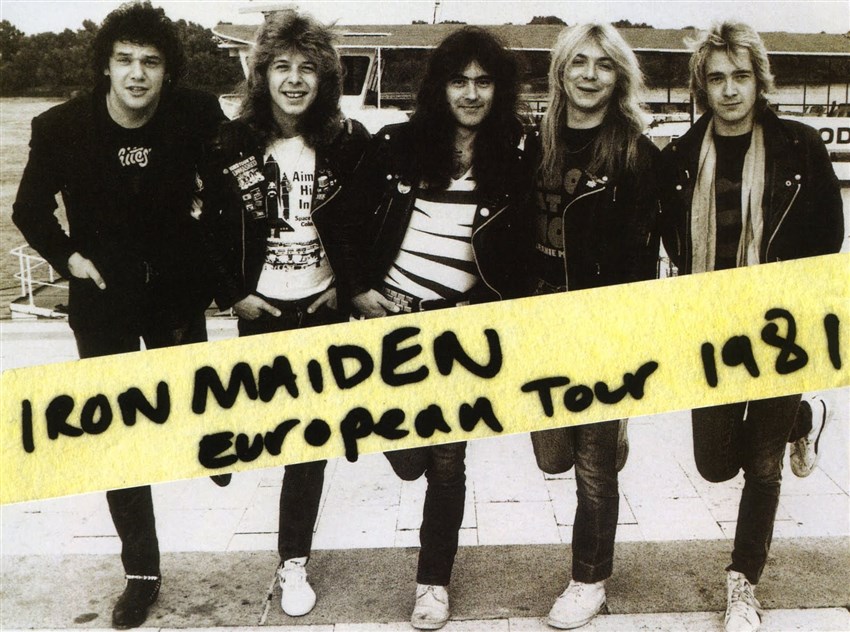
Iron Maiden recruited another guitarist in 1977, Bob Sawyer, who was sacked for embarrassing the band on stage by pretending to play guitar with his teeth. Tension ensued again, causing a rift between Murray and Wilcock, who convinced Harris to fire Murray, as well as original drummer Ron Matthews. A new line-up was put together, including future Cutting Crew member Tony Moore on keyboards, Terry Wapram on guitar and drummer Barry Purkis (better known today as Thunderstick). After a single gig with the band in January 1978, Tony Moore was asked to leave as Steve Harris decided keyboards did not suit the band's sound. Dave Murray rejoined in late March 1978, and when Terry Wapram disapproved he was sacked. A few weeks later, Dennis Wilcock decided to leave Iron Maiden to form his own band, V1, with Terry Wapram, and drummer Barry Purkis also left. Doug Sampson was at Dennis' and Thunderstick's last gig, and joined the band afterwards.
Steve Harris, Dave Murray and Doug Sampson spent the summer and autumn of 1978 rehearsing while they searched for a singer to complete the band's new line-up. A chance meeting at the Red Lion, a pub in Leytonstone, in November 1978 evolved into a successful audition for vocalist Paul Di'Anno. Steve Harris said, "There's sort of a quality in Paul's voice, a raspiness in his voice, or whatever you want to call it, that just gave it this great edge". At this time, Murray would typically act as their sole guitarist, with Harris commenting, "Davey was so good he could do a lot of it on his own. The plan was always to get a second guitarist in, but finding one that could match Davey was really difficult".
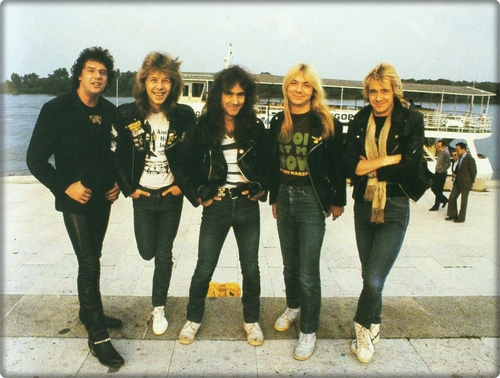
Record contract and early releases (1978–1981)
On New Year's Eve, 1978, Iron Maiden recorded a four-song demo at Spaceward Studios in Cambridge. Hoping the recording would help them secure more gigs, the band gave a copy to Neal Kay, who, at the time, was managing a heavy metal club called, Bandwagon Heavy Metal Soundhouse. After hearing the tape, Neal Kay began playing the demo regularly at the Bandwagon, and one of the songs, "Prowler", eventually went to No. 1 in the Soundhouse charts, which were published weekly in Sounds magazine. A copy was also acquired by Rod Smallwood, who soon became the band's manager.
As Iron Maiden's popularity increased, they released the demo on their own record label as The Soundhouse Tapes, named after the club. Featuring only three tracks (one song, "Strange World", was excluded as the band were unsatisfied with its production), all 5,000 copies sold out within weeks. In December 1979, the band secured a major record deal with EMI and asked Dave Murray's childhood friend, Adrian Smith of Urchin, to join the group as their second guitarist. Busy with his own band, Smith declined and Dennis Stratton was hired instead. Shortly after, Doug Sampson left due to health issues and was replaced by ex-Samson drummer Clive Burr at Stratton's suggestion on December 26, 1979.
Iron Maiden's first appearance on an EMI album was on the Metal for Muthas compilation (released on February 15, 1980) with two early versions of "Sanctuary" and "Wrathchild". The release led to a tour including several other bands linked with the new wave of British heavy metal movement.
Iron Maiden released their self-titled album in 1980, which debuted at No. 4 in the UK Albums Chart. In addition to the title track, the album included other early favourites such as "Running Free", "Transylvania", "Phantom of the Opera" and "Sanctuary" – which was not on the original UK release, but appeared on the US version and subsequent remasters. The band embarked on a headline tour of the UK, before opening for Kiss on their 1980 Unmasked Tour's European leg as well as supporting Judas Priest on select dates. After the Kiss tour, Dennis Stratton was dismissed from the band as a result of creative and personal differences, and was replaced by Adrian Smith in October 1980. In December, the band played at the Rainbow Theatre in London, where their first live video was filmed. Live at the Rainbow was released in May 1981, and "Iron Maiden" and "Wrathchild" from this video received heavy rotation on MTV during its first hours on the air as the first metal videos ever.
In 1981, Iron Maiden released their second studio album, Killers. Although many tracks were written prior to their debut release, it had two new songs: "Prodigal Son" and "Murders in the Rue Morgue" (the latter's title was taken from the short story by Edgar Allan Poe). Unsatisfied with the production on their debut album, the band hired veteran producer Martin Birch, who would continue to work with Iron Maiden until his retirement in 1992. Martin Birch died on August 9, 2020. The record was followed by the band's first world tour; their debut performance in the United States, opening for Judas Priest at The Aladdin Casino in Las Vegas. Killers marked the band's USA album charts debut, reaching No. 78 on the Billboard 200, and they booked 132 shows to promote the album, including their first concert in Belgrade, Yugoslavia. During the summer, Iron Maiden played several festivals in Europe, including at the Golden Summernights 1981 festivals at Zeppelinfeld in Nuremberg in front of 100,000 people.
Success (1981–1985)
By 1981, Paul Di'Anno was demonstrating increasingly erratic behaviour, particularly due to his drug usage, about which Di'Anno comments, "It wasn't just that I was snorting a bit of coke, though; I was just going for it non-stop, 24 hours a day, every day ... the band had commitments piling up that went on for months, years, and I just couldn't see my way to the end of it. I knew I'd never last the whole tour. It was too much".
Paul Di'Anno was dismissed following the Killer World Tour, and the band had already selected his replacement. After a meeting with Rod Smallwood at the Reading Festival, Bruce Dickinson, formerly of Samson, auditioned for Iron Maiden in September 1981 and was immediately hired. The following month, Dickinson went out on the road with the band on a small headlining tour in Italy and a one-off show at the Rainbow Theatre in the UK. For the last show, and in anticipation of their forthcoming album, the band played "Children of the Damned" and "22 Acacia Avenue", introducing fans to their new material.
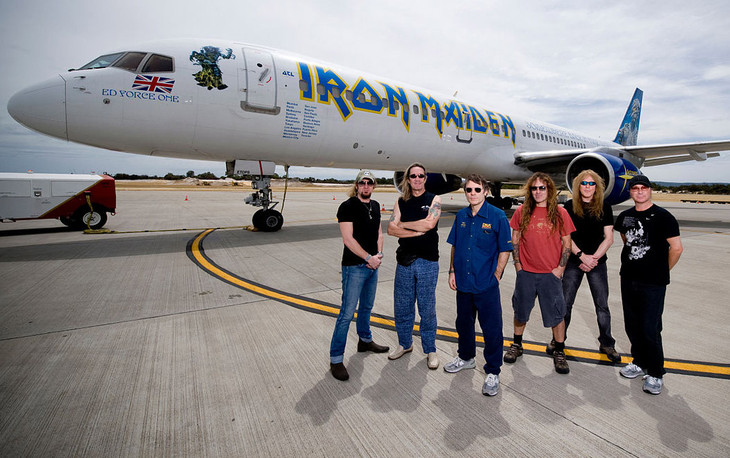
In 1982, Iron Maiden released their third studio album, The Number of the Beast, which became the band's first No. 1 record on the UK Albums Chart, was a Top 10 hit in many other countries and reached No. 33 on the Billboard 200. At the time, Bruce Dickinson was in the midst of legal difficulties with Samson's management and was not permitted to add his name to any of the songwriting credits, although he still made what he described as a "moral contribution" to "Children of the Damned", "The Prisoner" and "Run to the Hills". The band embarked on a world tour, dubbed The Beast on the Road, with shows in North America, Japan, Australia and Europe, including a headline appearance for 40,000 people at the Reading Festival. Iron Maiden played 188 shows in 10 months. The Beast on the Road's US leg proved controversial when an American conservative political lobbying group claimed Iron Maiden were Satanic because of the new album's title track and "demonic" cover art, and a group of Christian activists destroyed Iron Maiden records in protest. Bruce Dickinson later said the band treated this as "silliness" and the demonstrations in fact gave them "loads of publicity". The Number of the Beast sold 2.5 million copies in its first year, 14 million by 2010, and 20 million by 2022.
In December 1982, drummer Clive Burr was fired from the band and replaced by Nicko McBrain, who previously played for Trust. Although Steve Harris said the dismissal took place because his live performances were affected by offstage activities, Clive Burr later claimed he was unfairly ousted from the band. The band then recorded the first of three consecutive albums at Compass Point Studios in the Bahamas. In 1983, they released their fourth studio album, Piece of Mind, which reached the No. 3 spot in the UK and No. 14 on the Billboard 200. Piece of Mind features the singles "The Trooper" and "Flight of Icarus", the latter being one of the band's few songs to gain substantial airplay in the US. Iron Maiden played 147 concerts in Europe and North America as a part of the World Piece Tour. This was also their first major North America tour as headliners, selling out Madison Square Garden with a crowd of 20,000.
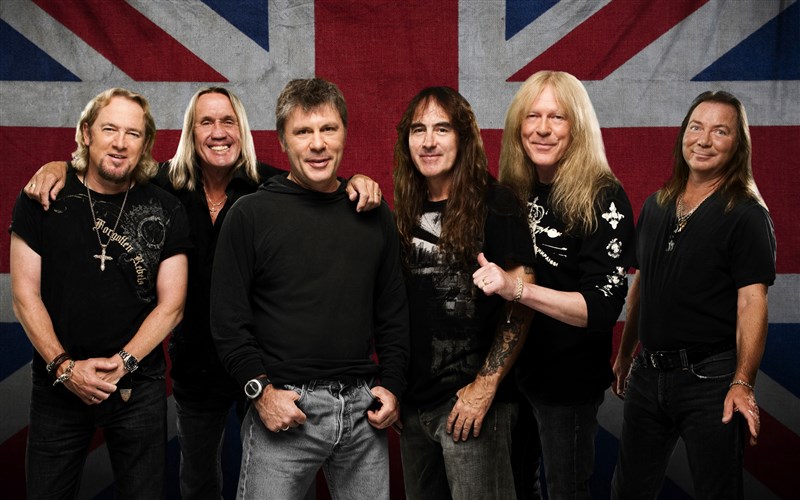
After the success of Piece of Mind and its supporting tour, the band released their fifth studio album, Powerslave, on September 9, 1984. The album features the singles "2 Minutes to Midnight" and "Aces High", the title track, and "Rime of the Ancient Mariner" (based on Samuel Taylor Coleridge's poem of the same name). Powerslave was another chart success, reaching No. 12 on the Billboard 200 and eventually No. 1 in the UK. The Band's fifth studio album sold over 4 million copies in its first year after premiere. The tour following the album, called World Slavery Tour, was the band's largest to date with 193 shows in 28 countries over 13 months, playing to an estimated 3,500,000 people.
Many shows were played back to back in the same city, such as in Long Beach, California, where the band played four consecutive concerts at Long Beach Arena for a combined audience of 54,000 fans. Iron Maiden also made their debut appearance in South America, where they co-headlined the Rock in Rio festival with Queen for an audience estimated at 350,000–500,000 people. The tour started in August 1984 with five shows in Poland. Iron Maiden were the first Western artists to bring full-scale production behind the Iron Curtain.
The band's third official video, entitled Behind the Iron Curtain, was released in October 1984. The World Slavery Tour documentary brought footage of the band touring eastern Europe in 1984, performing shows in the countries visited, Behind the Iron Curtain was the first documentary ever published by a Western artist that showed them touring the countries of Eastern Bloc.
The tour was physically gruelling for the band, who demanded six months off when it ended (although this was later reduced to four months). This was the first substantial touring break in the group's history, including the cancellation of a proposed supporting tour for the new live album, with Bruce Dickinson threatening to quit unless the tour ended. In October 1985, Iron Maiden released the double live album and home video, Live After Death. A critical and commercial success, it peaked at No. 19 on the Billboard 200 and No. 2 in the UK. The album was recorded at Long Beach Arena and also features additional tracks from four nights at London's Hammersmith Apollo. In November 1985, Iron Maiden were named the best rock and metal band in the world and awarded at Public Choice International.
Experimentation (1986–1989)
Returning from their time off, the band added different musical elements to their 1986 studio album, Somewhere in Time. These focused on synthesised bass and guitars to add textures and layers to the sound. The release performed well across the world, particularly the single "Wasted Years", but included no writing credits from Bruce Dickinson, whose material was rejected by the rest of the band. The album was the band's biggest American chart success to date, reaching No. 11 on the Billboard 200 and No. 2 in the UK charts. The Somewhere on Tour was also a success.
The band played 157 shows for over two and a half million fans, including eighty-one shows in North America. Once again, Iron Maiden visited Poland, Hungary and Yugoslavia to play for tens of thousands fans in each country. The experimentation evident on Somewhere in Time continued on their next album, Seventh Son of a Seventh Son, which was released in 1988. A concept album recorded at Musicland Studios in Munich and based on the 1987 novel Seventh Son by Orson Scott Card, it was the band's first record to include keyboards, which were performed by Steve Harris and Adrian Smith. Bruce Dickinson's enthusiasm was also renewed as his ideas were accepted for this album.
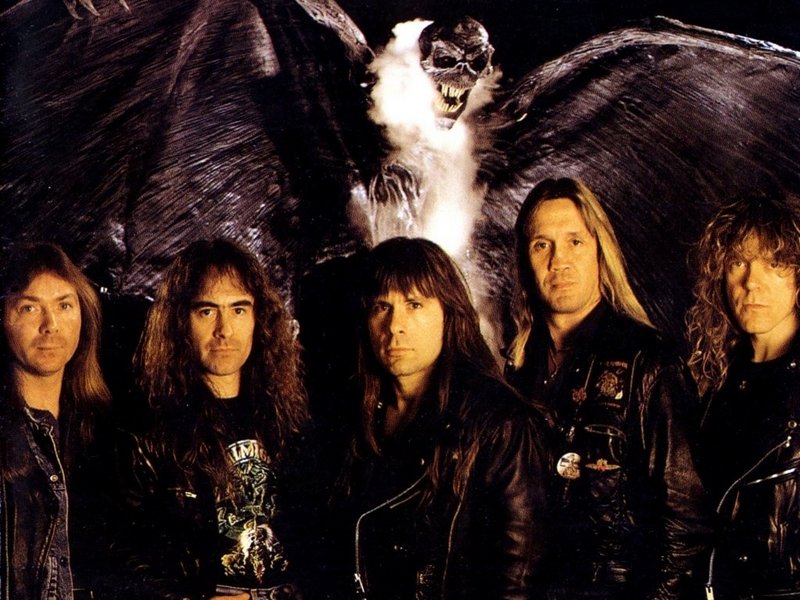
Another popular release, it became Iron Maiden's second album to hit No. 1 in the UK charts and reached No. 12 on the Billboard 200.
During the following tour, the band headlined the Monsters of Rock festival at Donington Park on 20 August 1988, playing to the largest crowd in the festival's history (107,000). The tour concluded with several headline shows in the UK in November and December 1988, with the concerts at the NEC Arena, Birmingham, recorded for a live video, entitled Maiden England. The video debuted at top spots of worldwide music videos charts. In May, the group set out on a supporting tour, which saw them perform 103 shows to well over two million people worldwide over seven months. To recreate the album's keyboards onstage throughout the tour, the group recruited Michael Kenney, Steve Harris' bass technician; Kenney has served as the band's live keyboard player ever since, also performing on the band's four following albums.
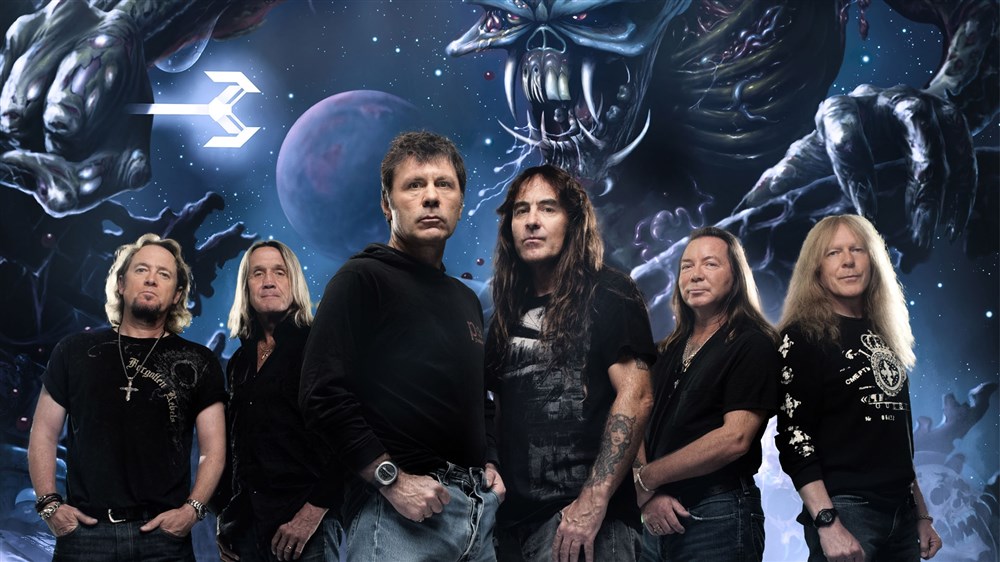
Upheaval (1989–1994)
During a break in 1989, guitarist Adrian Smith released a solo album with his band ASAP, entitled Silver and Gold. Vocalist Bruce Dickinson also began work on a solo album with former Gillan guitarist Janick Gers, releasing Tattooed Millionaire in 1990, followed by a tour. At the same time, to mark the band's 10-year recording anniversary, Iron Maiden released a compilation collection, The First Ten Years, a series of 10 CDs and double 12-inch singles.
Between February 24, and April 28, 1990, the individual parts were released one by one, each containing two of Iron Maiden's singles, including the original B-sides. Iron Maiden then began work on a new studio album. During the pre-production stages, Adrian Smith left the band due to differences with Steve Harris regarding the direction the band should be taking. Smith disagreed with the "stripped down" style they were leaning towards.
Janick Gers, having worked on Bruce Dickinson's solo project, was chosen to replace Smith and became the band's first new member in seven years. The album No Prayer for the Dying was released in October 1990. It contained the hit singles "Holy Smoke" and "Bring Your Daughter... to the Slaughter", the band's first – and, to date, only – UK Singles Chart No. 1, originally recorded by Dickinson's solo project for the soundtrack of A Nightmare on Elm Street 5: The Dream Child. Iron Maiden's eighth studio album debuted at No. 2 on the UK albums chart and No. 17 on the Billboard 200. No Prayer for the Dying was a return to their musical roots, especially in simplicity of composition. The No Prayer on the Road tour was booked for 120 shows in Europe, North America and Japan. Thirty-three shows in continental Europe were sold out with a reported 530,000 fans attending. In total, Iron Maiden played for some two million fans.
After another break, the band recorded their next studio album, Fear of the Dark, which was released in 1992. The title track became a regular part of the band's concert setlists. Achieving their third No. 1 on the UK albums chart and No. 12 on the Billboard 200, the release also included the No. 2 single "Be Quick or Be Dead", the No. 21 single "From Here to Eternity", and the softer "Wasting Love". The album featured the first songwriting by Janick Gers, and no collaboration between Steve Harris and Bruce Dickinson on songs.
The extensive worldwide tour that followed included their first-ever Latin American leg, although Christian organisations prevented Iron Maiden from performing in Chile and accused them of being "emissaries of satanic propaganda", and headlining the Monsters of Rock festivals in seven European countries. Iron Maiden's second performance at Donington Park, for a sold-out audience of 75,000, was filmed for the audio and video release Live at Donington and featured a guest appearance by Adrian Smith, who joined the band to perform "Running Free". The tour also saw conflicts between Bruce Dickinson and rest of the band.
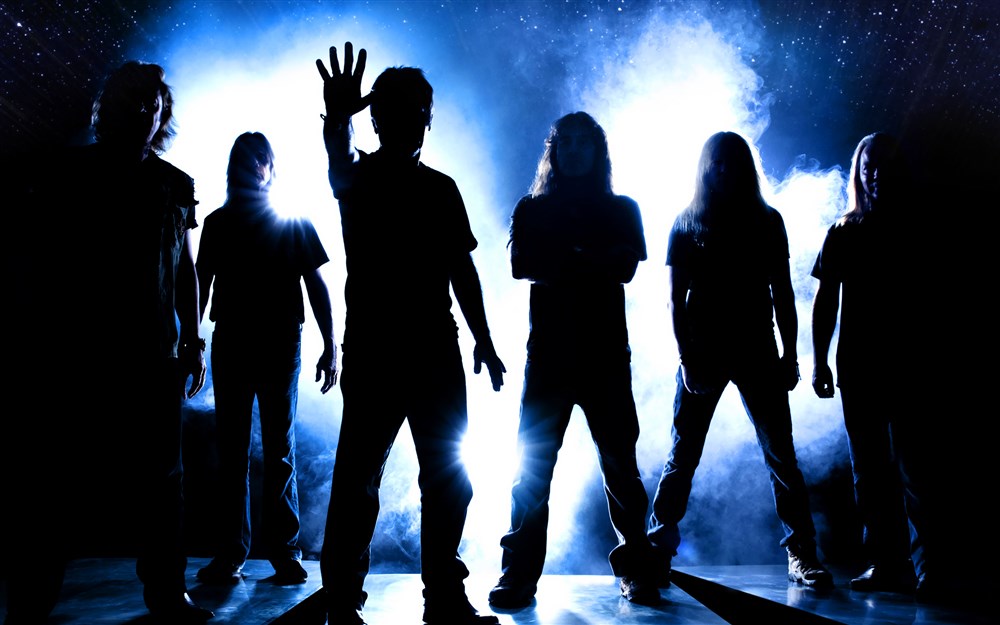
In 1993, Dickinson left the band to pursue his solo career, but agreed to remain for a farewell tour and two live albums (later re-released in one package). The first, A Real Live One, was released in March 1993 and featured songs from 1986 to 1992, and the second, A Real Dead One, was released after Bruce Dickinson left the band and featured songs from 1980 to 1984. The tour did not go well, with Steve Harris claiming Bruce Dickinson would only perform properly for high-profile shows, and that at several concerts, he would only mumble into the microphone. Dickinson denied he was under-performing, saying it was impossible to "make like Mr. Happy Face if the vibe wasn't right", and that news of his exit from the band had prevented any chance of a good atmosphere during the tour. Bruce Dickinson played his farewell show with Iron Maiden on August 28, 1993. The show was filmed, broadcast by the BBC and released on video under the name Raising Hell.
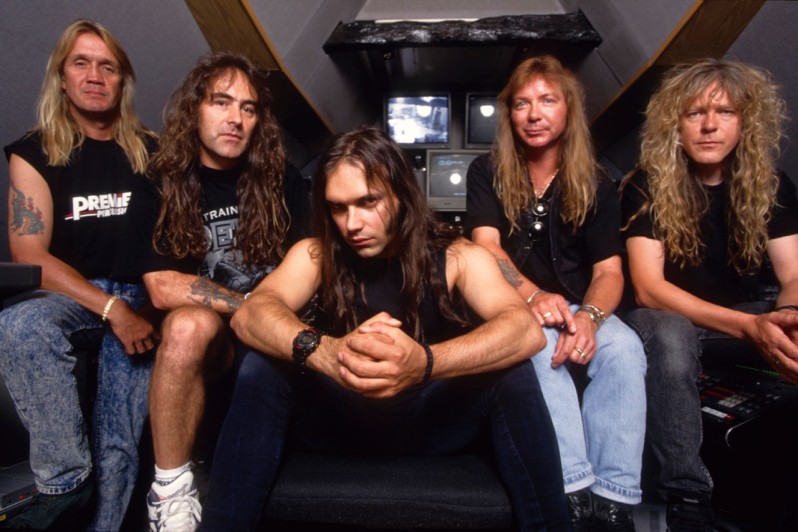
Difficulties (1994–1999)
In 1994, the title track from Fear of the Dark album received a Grammy Awards nomination for "Best Metal Performance", a first for Iron Maiden. They approached Damian Wilson to audition and considered him as a replacement for the departing Bruce Dickinson, he declined the offer. The band listened to hundreds of tapes sent in by vocalists before convincing Blaze Bayley, formerly of the band Wolfsbane, who had supported Iron Maiden in 1990, to audition for them.
Steve Harris' preferred choice from the outset, Bayley had a different vocal style from his predecessor and ultimately received a mixed reception among fans. After a three-year hiatus – a record for the band at the time – Iron Maiden released their next studio album, The X Factor. The band had their lowest chart position since 1981 for an album in the UK (debuting at No. 8), although it went on to win "Album of the Year" awards in France, Spain and Germany. The record included the 11-minute epic "Sign of the Cross", the band's longest song since "Rime of the Ancient Mariner", as well as the singles "Man on the Edge"
(based on the film Falling Down) and "Lord of the Flies", based on the novel of the same name. The release is notable for its "dark" tone, inspired by Steve Harris' divorce.
The band toured for the rest of 1995 and 1996, playing their first shows in Israel and South Africa as well as Malta, Bulgaria and Romania in Europe, before concluding in the Americas. The biggest show of the whole tour was a headline appearance for 60,000 people at the Monsters of Rock festival in São Paulo, Brazil.The X Factor sold 1.3 million copies, the lowest sales result since 1981. After the tour, Iron Maiden released a compilation album, Best of the Beast. The band's first compilation, it included a new single, "Virus", in which the lyrics attack critics who had recently written off the band.
In 1998, Iron Maiden released Virtual XI, whose chart scores were the band's lowest to date. The album peaked at No. 16 in the UK, the band's lowest for a new studio record. At the same time, Steve Harris assisted in remastering the band's entire discography, up to and including Live at Donington. Blaze Bayley's tenure in Iron Maiden ended in January 1999 when he was asked to leave during a band meeting. The dismissal took place due to issues Bayley had experienced with his voice during the Virtual XI World Tour, although Janick Gers said this was partly the band's fault for forcing him to perform songs pitched outside the natural range of his voice.
Reunion and renewed success (1999–2005)
The band entered into talks with Bruce Dickinson, who agreed to rejoin during a meeting in Brighton in January 1999, along with guitarist Adrian Smith, who was telephoned a few hours later With Janick Gers remaining, Iron Maiden now had a three-guitar line-up (called "The Three Amigos"), and embarked on a hugely successful reunion tour. Dubbed The Ed Hunter Tour, it tied in with the band's newly released greatest hits collection, Ed Hunter, whose track listing was decided by a poll on the group's website, and also contained a computer game of the same name starring the band's mascot.
Not satisfied with the results from Harris' Barnyard Studios, located on his property in Essex, which had been used for the last four Iron Maiden studio albums, the band recorded the new release, Brave New World, at Guillaume Tell Studios in Paris, France in November 1999 with producer Kevin Shirley. Iron Maiden continued to find inspiration in movies and books, as shown in songs like "The Wicker Man" – based on the 1973 British cult film of the same name – and "Brave New World" – a title taken from the Aldous Huxley novel of the same name.
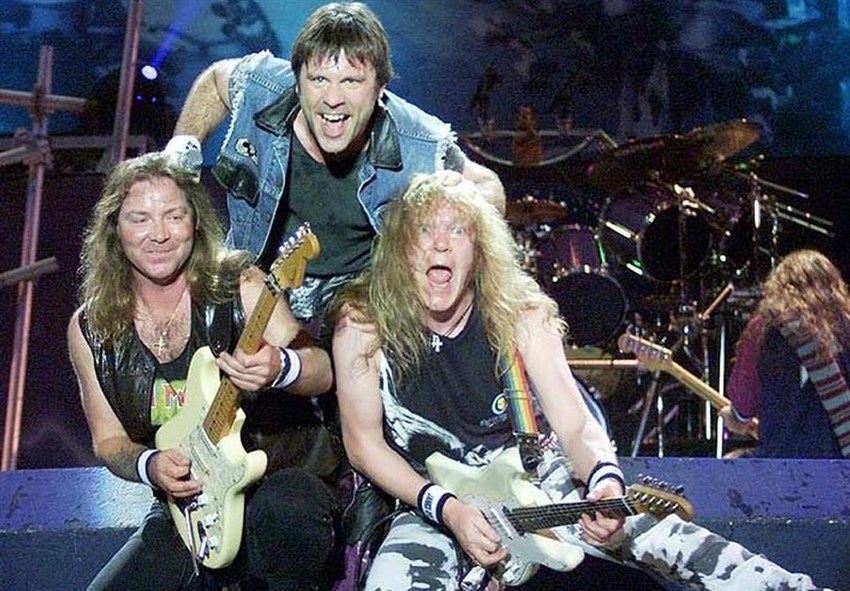
The album revisited the more progressive and melodic sound featured in some earlier recordings, along with elaborate song structures and keyboard orchestration. The album was a commercial and artistic success.
The reunion world tour that followed had over 100 dates (including 31 shows of the 1999 tour), and culminated on January 19, 2001 in a show at the Rock in Rio festival in Brazil, where Iron Maiden played to an audience of over 250,000. While the performance was being produced for a CD and DVD release in March 2002, under the name Rock in Rio, the band took a year off from touring, although they played three consecutive shows at Brixton Academy to raise funds for former drummer Clive Burr, who had recently announced that he had been diagnosed with multiple sclerosis. The band performed two further concerts for Burr's MS Trust Fund charity in 2005, and 2007, before his death in 2013. During the 2000–2002 tour, Iron Maiden played 91 shows for over two million people in 33 countries. In addition to their touring success, the band were nominated twice for the annual Grammy Awards and received the International Achievement Award at the 2001 Ivor Novello Awards.
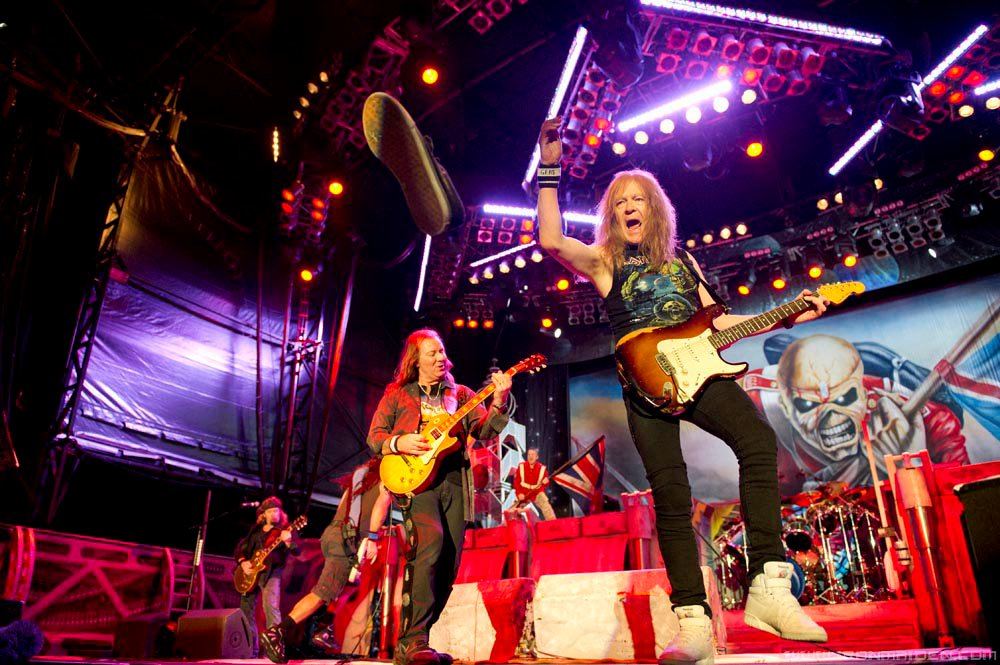
Following their summer 2003 Give Me Ed... 'Til I'm Dead Tour, with 57 shows in Europe and North America and headlining large festivals such as Roskilde, Heineken Jammin' Festival, Rock am Ring and Rock im Park (combined attendance of 130,000) and the first Download Festival held at Donington Park; a successor to Monsters of Rock, Iron Maiden released Dance of Death, their thirteenth studio album. It met with worldwide critical and commercial success, reaching No. 2 on the UK Albums Chart and No. 18 on the Billboard 200.
Produced by Kevin Shirley, now the band's regular producer, many critics felt this release reached the standard of their earlier efforts. Historical and literary references were present, with "Montségur" focussing on the Cathar stronghold conquered in 1244, and "Paschendale" relating to the First World War battle. During the Dance of Death Tour 2003–2004, which began in September 2003, Iron Maiden played 53 shows across Europe, North America, Latin America and Japan. The band's performance at Westfalenhalle, in Dortmund, Germany, was recorded and released in August 2005 as a live album and DVD entitled Death on the Road.
In 2005, the band announced the Eddie Rips Up the World Tour, which, tying in with their 2004 DVD entitled The History of Iron Maiden – Part 1: The Early Days, only featured material from their first four albums. As part of this celebration of their earlier years, "The Number of the Beast" single was re-released and went straight to No. 3 on the UK Chart. The tour featured many headlining stadium and festival dates, including a performance at Ullevi Stadium in Sweden to an audience of almost 60,000. This concert was also broadcast live on satellite television across Europe to approximately 60 million viewers. The band completed the tour by headlining the Reading and Leeds Festivals on August 26-28, and the RDS Stadium in Ireland on August 31.
Source: Wikipedia

